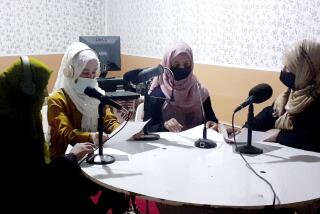Radio Free Asia Is Generating Static
- Share via
BEIJING — Moses Sun came to the tiny South Pacific island of Belau to spread the word of Jesus to his native China.
But last week, when his Voice of Hope radio station on the island east of the Philippines began transmitting Radio Free Asia broadcasts into China, Sun reluctantly found himself on the front lines of America’s controversial new shortwave radio service aimed at the People’s Republic.
“China is a field reserved for God himself to plow,” the Beijing native, who changed his name to Moses after graduating from the Assembly of God seminary in Springfield, Mo., said in a telephone interview.
Sun, director of Mandarin broadcasts at the station, said he objected strongly when his employer, High Adventure Ministries of Simi Valley, Calif., which operates the Voice of Hope, signed a contract this month to transmit two hours of heavily political, U.S.-funded Radio Free Asia programming each day into China. “I’m afraid if the Chinese government hears this,” Sun said, “they might jam our station. We have a higher message than politics.”
The Belau station illustrates just how far afield Radio Free Asia has been forced to go to get its message on the air. Created last year after bitter debate in Congress, where its main supporters included Senate Foreign Relations Chairman Jesse Helms (R-N.C.), Radio Free Asia has had to scramble to find suitable transmission sites and continues to face political static at home and abroad.
The new shortwave network, modeled after Radio Free Europe, suffered another blow Jan. 1 when Armenia, one of its transmission sites, canceled its contract for Chinese broadcasts under pressure from Beijing.
Because of its political content, Radio Free Asia has been attacked often and vigorously by the governments and media of China, Vietnam, Myanmar, Cambodia, Laos and North Korea.
“Although the Cold War has been over for years,” the official China Youth Daily newspaper said in a November editorial, “the real goal of setting up ‘Radio Free Asia’ is to use news media to interfere in the internal affairs of China and other Asian nations, to create chaos and to destroy the stability of these countries.”
Mandarin broadcasts began in September. Radio Free Asia launched a Tibetan service in December. Vietnamese, Korean, Burmese, Laotian and Cambodian programs are planned.
Many U.S. diplomats also regard the fledgling radio service with open disdain, describing it as unnecessary, expensive and overly provocative at a time when the Clinton administration is pursuing a “policy of engagement” in the region.
“Far be it from me to tell Congress what they ought to do,” James R. Sasser, the U.S. ambassador to China, said in an interview earlier this month. “But in this age of trying to streamline government, and in an age of budget austerity, the case could be made that there’s duplication of effort here.”
Radio Free Asia also faces fierce opposition inside the U.S. information bureaucracy, particularly from the more mainstream Voice of America and the United States Information Agency. Their employees resent Radio Free Asia’s $10-million start-up cost and $9.3-million annual budget, which come at a time when their agencies face severe budget cuts.
“They claim it is a coincidence,” said one angry Washington staffer at VOA, which broadcasts 10 hours of Mandarin programming into China from transmitters in Thailand and Russia, “but we got a big huge cut at the same time they started up. And they cut our broadcast hours.”
But the new network’s Washington-based directors insist that despite start-up problems, Radio Free Asia is off to a good beginning, providing what they call “surrogate” broadcasting of Chinese and Tibetan news--including reports on dissidents and other sensitive subjects--inside China.
“As it turned out, since we began broadcasting in September there have been innumerable reports of crackdowns on dissidents and freedom by the government of China,” said Richard Richter, Radio Free Asia’s president. “Consequently, our initial image is one of being very provocative.”
Critics of the new radio service argue that the Voice of America already devotes considerable coverage to dissidents and human rights abuses in China. Radio Free Asia’s preoccupation with these subjects, they contend, is unnecessarily provocative and gives the impression of targeting China.
The Radio Free Asia service was initially plagued by what some said was its weak signal. Embassy and consulate officials across China complained that they were unable to pick up the broadcasts.
But the biggest problem facing the radio service so far, Richter said, has been finding nearby countries willing to allow transmissions into Chinese territory.
Thailand, which transmits VOA into China from a powerful transmitter in Udorn, near the border with Laos, refused to carry the Radio Free Asia signal and has joined in the chorus of Asian countries opposing it. Under pressure from the Chinese government, transmission sites in the former Soviet republics of Kazakhstan and Armenia were closed by their governments. But both Kazakhstan and Armenia have agreed to continue broadcasts into other parts of Asia.
Unable to find ideal transmission sites, Radio Free Asia has been forced to seek transmitters on the outer periphery of China, sometimes piggybacking on transmissions from Christian stations.
And the situation remains politically sensitive. The service now broadcasts on four frequencies from two sites in the Central Asian state of Tajikistan; a Christian Science transmitter on Saipan island in the Marianas chain; and the Voice of Hope station on Belau operated by evangelist George Otis’ High Adventure Ministries.
Otis, like Moses Sun, said he will not let the Radio Free Asia broadcast interfere in any way with the Voice of Hope’s main message: spreading Christianity to Asia. To emphasize the separation between the religious and political messages, he said, he has arranged for a separate 100,000-watt transmitter that will be devoted exclusively to Radio Free Asia broadcasts.
“We are tiny in this thing,” Otis said. “We are grateful for it if it helps continue our good work. But if we find, and this is in our arrangement with them, that they are doing propaganda and they are against the government of China in something, then we could cut it off like a flash. We are set up that way, and we intend to use that switch.”
More to Read
Sign up for Essential California
The most important California stories and recommendations in your inbox every morning.
You may occasionally receive promotional content from the Los Angeles Times.










